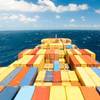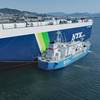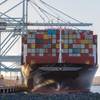Transport via Northern European ports more sustainable
On the European continent, the Alps form a natural barrier for international transport. Containers can be transported to Southern Germany, the Czech Republic or Poland cheaper as well as more sustainably via North European ports than via Southern European ports. This is despite the fact that the container ships between Asia and Europe always take the Suez Canal with the ensuing shorter sailing route to southern ports such as Koper, Constanta and Genoa. Research by Panteia into the environmental footprint logistics chains in Europe proves this. Panteia also has identified opportunities for making the transport more sustainable.
Allard Castelein, CEO Port of Rotterdam Authority: ‘The Northern European ports perform well because many large container vessels call here, and much of the hinterland transport is done by inland shipping and rail. This provides for a relatively small ecological footprint, even though the route is longer. But the report also shows that further improvement is possible, especially by using LNG as a transport fuel and making logistics more efficient through IT. These are two important challenges for the coming years.’
According to the study, the daily emissions of a 20,000 TEU vessel (TEU is a standard unit for container capacity), as measured by container, are far lower than those of a 10,000 TEU vessel. The difference in CO₂ emissions can be as high as 50%. Using large vessels therefore reduces the footprint. These large vessels call relatively more frequently at the large North European ports than at the smaller Southern European ports, because more goods are shipped to and from this densely populated region.
The report concludes that imposing a Sulphur Emission Control Area (SECA) on the Mediterranean will result in reduced emission of sulphur dioxide, but in practically no changes to the market share of the various ports. The researchers call this a ‘quick win’ in the fight against air pollution. Currently the rules for emissions from shipping are stricter in the North Sea and the Baltic Sea than the Mediterranean. The researchers believe that the southern ports do not gain any competitive advantage from this.
The use of LNG as transportation fuel in logistics (shipping, inland shipping, truck) has a positive effect mainly on inland shipping and coastal shipping. This makes logistics chains more sustainable via ports which have a large percentage of their hinterland transport organized by barges and coastal shipping, such as the port of Rotterdam. Trains are able to run on 100% renewable energy.
A broad application of IT can improve the efficiency of logistics and the load factor of containers and transport modalities. Panteia estimates a maximum CO2 reduction of 5% to 10%.
Major shippers and logistics companies were interviewed for the study. Price is the most important criterion for them, followed by service and reliability. Sustainability is not an important criterion. Sustainability is a deal maker, but not a deal breaker yet.
This means that legislation and incentives are important in ensuring that logistics are made more sustainable. Port authorities, transport companies and governments play an important part in this. For example, they can stimulate the use of LNG instead of diesel or fuel oil, stimulate inland shipping and rail, and develop IT to make logistics chains more efficient. Sea ports can use incentives for cleaner ships to contribute effectively to more sustainable logistics. Measures which reduce costs as well as the emissions are therefore very interesting.
The research of Panteia was commissioned by the Port of Rotterdam Authority and Deltalinqs. The Port Authority wants to play a leading role in the transition to reduce the environmental footprint of transport and believes decisions on this topic should be based on facts.










